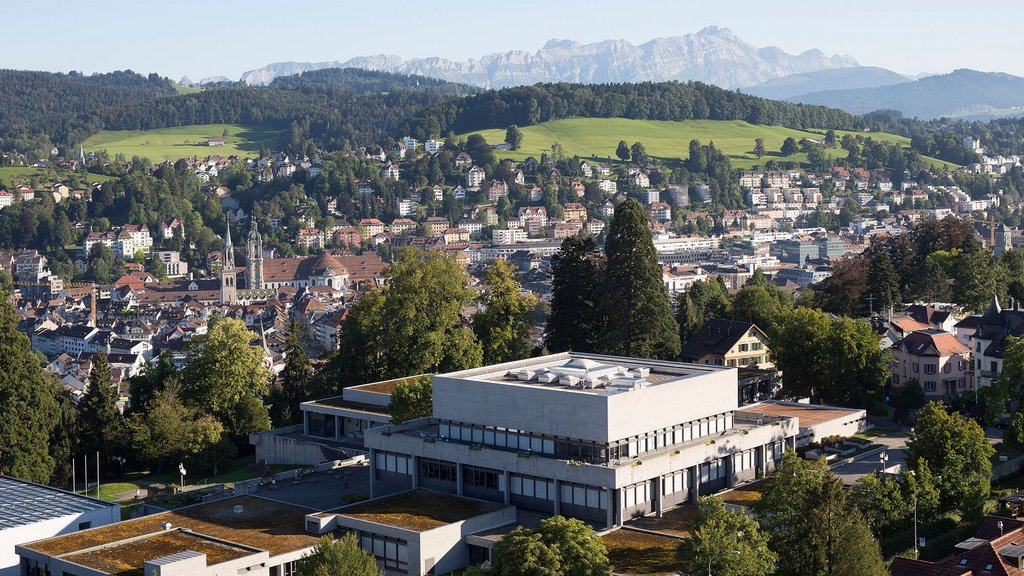Campus - 12.07.2021 - 00:00
Consequences of the pandemic: 30 million less value created by the HSG in the canton
In late May, the University of St.Gallen (HSG) published a study of its regional impact for the seventh time. The study showed that the HSG’s 2019 value creation for the Canton of St.Gallen amounted to CHF 276.5m. Now, a special evaluation of the monetary effects of 2020 reveals the consequences of Covid-10: within a year, the HSG’s monetary value creation dropped by just over CHF 30m, to CHF 246m. The main cause is constituted by the lower purchasing power effects of the students, who were not on site owing to distance learning. The evaluation is an impressive demonstration of the possible consequences for the canton if the principle of the “classroom university” were to be abandoned.

12 July 2021. The study entitled “Regionaler Impact der Universität St.Gallen im Jahr 2019” established that the University created a record-level value contribution of CHF 276.5m for the canton. However, the 2020 pandemic put a serious damper on this. As an analysis of the HSG’s monetary effects for the canton reveals, value creation dropped by just over CHF 30m in 2020. This value was calculated with the help of a complex impact model which was based on surveys among students and in-house executive education providers and also took into consideration changes in the University’s budget. The main reason for the decline is the changeover to distance learning in teaching and executive education, as well as its consequences.
Fewer students resident in the canton
Distance learning resulted in a decrease in the number of students who are resident in the canton. According to a representative survey conducted in March 2021, approx. 82 per cent of HSG students live in the canton under normal circumstances. During distance learning, this dropped to about 52 per cent. However, most of the students who left retained their flats in St.Gallen although they lived elsewhere for most of the time in 2020. The most important reason given by students for a change of residence was the need to be closer to their families, friends and partners. Still, two out of three students who changed residence intend to return to St.Gallen when classroom teaching is resumed.
Lower costs of living
When students do not live in St.Gallen, the lion’s share of their costs of living is spent elsewhere. This deprives the canton of purchasing power. In addition, 70 per cent of students indicate that they spent less money during the pandemic, particularly on leisure (-59 per cent), consumption such as clothing (-29 per cent), mobility (-23 per cent), as well as accommodation and food/meals (-19 per cent each). In sum, their costs of living decreased by 21 per cent. In combination, this led to a distinct reduction in students’ purchasing power effects in the Canton of St.Gallen, namely by just under CHF 20m – from CHF 127.3m (2019) to CHF 107.7m. This is likely to have primarily been felt by catering and trade. This illustrates the economic significance of a “classroom university” for its home canton.
Fewer events and executive education courses on site
As a consequence of Covid-19, the event business suffered substantially, and executive education courses were also affected: some were postponed, others took place online, which had an adverse effect on the hotel trade, in particular. As a consequence of the pandemic, the overnight stays generated by the HSG decreased by approx. 20,000, to 15,700, which was tantamount to about 11 per cent of overnight stays in the City of St.Gallen (2019: 15 per cent). Although the number of events only decreased by a third (from 300 to 200), it was particularly large-scale events that were affected by restrictions: cancellations, capacity limitations and fewer international participants caused a distinct reduction in the number of participants of approx. 30,000 to 10,000. If we look at the number of days that participants spent in the Canton of St.Gallen (events multiplied by the number of participants on site), we can see a massive drop by just under 80,000, to about 23,000. All in all, the direct effects of executive education declined by almost two thirds: from CHF 8.7m to CHF 3.1m.
University budget: slight impact
Conversely, the pandemic only had a slight effect on the consolidated budget of the University, which was CHF 4.3m lower in comparison with the preceding year (CHF 240.9m). Thus the University’s material costs dropped by more than CHF 10m despite higher expenses on distance learning (technical equipment, software solutions) and the necessary hygiene measures on the campus. Tuition fees declined, too, as did the revenue from executive education, in particular (minus CHF 8.5m), with the corresponding expenditure also decreasing. All in all, this demonstrates how important classroom courses in teaching and executive education are for the HSG: not solely for didactic reasons, but also in view of the monetary impact on the canton. The developments of 2020 clearly reveal the considerable losses sustained by the regional economy. In the longer term, a negative impact on the other effects (such as the regional labour market, knowledge system and image) may well also become palpable.
Background of the special evaluation
The survey about the HSG’s regional impact published in May 2021 was already the seventh study of this type. Its methodology was adapted to the Business School Impact Survey (BSIS) of the international university accreditation organisation EFMD for the first time, and the geographical frame of reference was extended to the Canton of St.Gallen in order to account for the HSG’s ownership structure. Besides the monetary effects, the study also establishes the impact on the regional labour market, corporate development, the cantonal knowledge system, as well as on the regional ecosystem and image. The special evaluation for 2020 published now, however, only analyses the monetary effects. A new complete study of the HSG’s regional impact is expected to appear in late 2022.
The entire report can be downloaded from the website of the University of St.Gallen.
More articles from the same category
Discover our special topics











